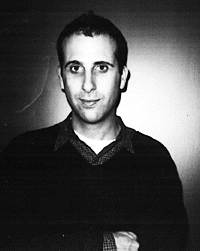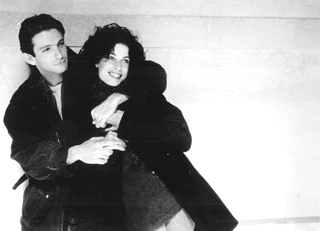The Job Goes on Forever
Breathing Room Producer Tim Perell
Fri., Feb. 28, 1997
 Tim Perell |
For me, the movies were an avocation, but for Tim they were a vocation -- or would soon be. Back then, he was a fledgling A&R scout for Warner Bros. Records, but over the next four years he would work for indie film guru John Pierson's completion fund, Islet, on films such as Just Another Girl on the I.R.T.; earn a Master's degree at the Royal College of Art in London, where he produced seven shorts, including the last film made by Derek Jarman; and read for Miramax, recommending, among other green-lightable projects, a script based on a little-known novel called The English Patient and the Stevie Ray Vaughan bio Caught in the Crossfire by Joe Nick Patoski and Bill Crawford (whose option was recently picked up by the studio for a second time). Then, in early 1995, Perell co-founded Eureka Pictures, and, ever since, he's produced low-budget indies of the sort Hollywood has taken to co-opting. To date, his films include: The Myth of Fingerprints, which debuted at this year's Sundance Film Festival and opens across the country in September; the forthcoming Louis and Frank, directed by Alexandre Rockwell and starring Rosie Perez, Steve Buscemi, and Tony Curtis; and Breathing Room, a romantic comedy that opens Friday at the Texas Union Theatre.
Actors act and directors direct, but what exactly does it mean to be a producer these days? "Every one does something different," Perell says. "Me, I'll work with a writer-director" -- he prefers to work only with writer-directors -- "on developing a script. They'll write a draft, give it to me, and we'll meet extensively for up to a year to discuss it. Then I'll raise money -- I'll find investors and structure the deal. Then I do casting, I see dozens of cinematographers and costume people, I hire a crew, etc. The creative impact comes through the choices you make. Then I turn around and do the deals with the actors' agents. That's my favorite part of making a movie these days -- the deals are so detailed and the agents are so aggressive that it becomes a lot of fun. My least favorite part is the actual making of the movie -- when you're actually shooting it. It becomes about problem-solving, juggling the egos of the cast and crew, staying on budget. It's incredibly demanding physically. But then everyone goes away and you get back to the good stuff, like editing, finding a composer. Then I spend, like, every day for months yelling and screaming at the distributor: They're not spending enough money, the ads are all wrong, the theatres the film is showing in are all wrong. It never stops."
In the case of Breathing Room, for instance, Perell and director Jon Sherman spent the spring and summer of 1994 working together on the script. Then Perell and his partner, Howard Bernstein, put together a prospectus for investors. "We knew it would be a low-budget film, so the odds were stacked against us," he says. "About 400 films of this size and scope are made every year, and only about 20 or 30 see the light of day. It's idiocy or hubris to go ahead. All you can do is find enough money to start shooting and then keep raising money." When it came time to hire a crew, Perell focused on people who would accept "step-up work" -- who would work for little or no money in exchange for experience: For his casting directors, he hired two young women who worked as assistants to other casting directors, meaning they knew every agent and actor in New York.
 Dan Futterman and Susan Floyd in Breathing Room |
Breathing Room was shot in 1995 -- but during editing the production ran out of money. Perell called his old friend John Pierson, who was with Miramax at the time, but the studio had just released Pulp Fiction and was heading in a star-driven indie film direction, so he couldn't do a deal. Before too long, however, Perell convinced his executive producer to come up with more money, and he hired a crackerjack sales agent (the veteran indie producer James Schamus of Good Machine). Still, things didn't go as planned. Although Perell and the filmmakers heard Breathing Room was going to be shown at Sundance, it didn't make the cut. "We were devastated," he says. "Our entire sales strategy revolved around Sundance, which now is the only place to go to sell a small movie."
Breathing Room eventually found a home at Arrow Pictures, the tiny distributor that handled My Life's in Turnaround and the Jim Jarmusch-Sam Fuller documentary Tigrero: A Film That Was Never Made, and it received generally good reviews following its limited release last fall... before, ironically, it was pushed off arthouse screens by The English Patient. But Tim Perell's not complaining; for an up-and-coming producer, release is all you can ask for. "My objective is to return money to the investors," he says, "but it's as important to be one of the 20 or 30 independents that get out there -- so you get to make more films. Anyway, we had a great opening weekend at the Angelika. It was a tremendous thrill." n
Breathing Room opens at the Texas Union Theatre Friday, Feb. 28 and plays at different times daily through Sunday, March 9. Check "Showtimes" this issue or call 475-6666 for schedule. Co-producers Tim Perell and Howard Bernstein and director/ co-writer Jon Sherman will all be on hand to introduce the film Friday, Feb. 28 at 7pm and conduct a brief Q&A following the screening.
Evan Smith is the deputy editor of Texas Monthly






